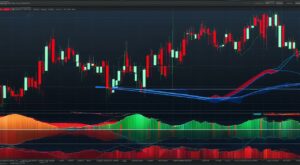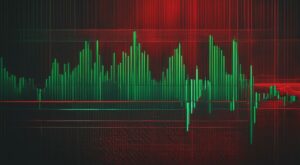Your cart is currently empty!
Is Leverage Considered Riba in Forex Trading? | Islamic View

Affiliate Disclaimer: This post may contain affiliate link or links
Is leverage considered Riba in Forex trading? In the high-stakes world of forex trading, which involves currency trading in financial markets, one question that frequently arises is whether leverage in forex trading amounts to riba under Islamic principles.
In forex, leverage amplifies trades, but excessive use may lead to interest (riba) concerns. Careful use aligns with Islamic finance principles; excessive leverage may risk violating them.
Contents
This topic not only covers the potential for significant capital gains but also dives into the complexities of risk in the financial realm. Islamic finance and Shariah law‘s principles guide this discussion.

Is leverage considered a riba in forex trading?
For newcomers, Forex trading can seem quite complicated, and one of the most frequently discussed topics is the role of leverage and whether it falls under riba (usury).
In Forex trading, leverage refers to a trader’s ability to control a significant amount of money with a small deposit and a virtual credit line from their broker.
Leverage in forex trading has both advantages and disadvantages. On the one hand, it can magnify profits, but on the other hand, it can also magnify losses. Therefore, it requires prudent and strategic application.
So, is it considered riba? Riba, a term that originated in Islamic law, means an excessive or predatory gain made in trade or business above the original capital. It is important to separate both terms.
Forex brokers provide leverage as a tool to trade large amounts with less capital. It is neither an interest nor an extra fee for your trade.
However, given that the concept of riba is quite complex and its interpretation can vary,.
Muslim traders seeking to engage in forex trading often consult with Islamic scholars to make sure their trading activities comply with Islamic principles.
Many brokers also offer “Islamic” or “Sharia-compliant” trading accounts that ensure all aspects of trading, including leverage use, are Halal.
Ultimately, the key to successful trading is understanding the instruments at work, including leverage, and using them strategically and ethically.

Forex trading and Islamic finance
When talking about forex trading, the guiding principles of Islamic finance and the related concept of riba are crucial elements to consider.
Understanding forex trading
Forex trading revolves around buying and selling currency pairs in the global financial markets.
Traders use trading accounts to initiate transactions, hoping to profit from fluctuations in the exchange rates between these pairs.
Forex traders can take advantage of forex leverage by borrowing money from their broker to control larger positions than their account balance would ordinarily allow. This is known as margin trading.
Forex trading happens in diverse ways, including day trading, scalping, and swing trading. Each of these strategies swings around entry and exit points in the market, aiming to generate capital gains.
Islamic finance principles and forex trading
The principles of haram (forbidden) and halal (permissible) form the foundation of Islamic finance, and riba is a key component of these principles.
Riba, or “making money from money,” like loan interest, is forbidden because it is seen as unjust enrichment—an unfair gain at someone else’s expense, often likened to money lending practices that earn unearned income.
Therefore, certain mainstream practices in forex trading may be at odds with these principles.
For instance, forex leverage involves the concept of borrowing money, and there might be uncertainty in contracts, especially since forex trading operates 24 hours a day.
Posing potential problems with delays in the delivery of currencies. These potentially infringe on the principles of something for nothing and unjust enrichment.

Is leverage a riba in forex trading?
One of the most robust debates in forex trading within Islamic finance surrounds the concept of forex leverage and whether it is considered riba or not.
The Concept of Riba
Derived from the teachings of Shariah law, riba is an Islamic principle that forbids the giving or receiving of interest rates (something termed loan interest) on borrowed money.
Seeing it as a form of unjust enrichment, unearned income, or something for nothing.
One way to see riba in action is through the practice of fractional reserve banking, whereby banks only reserve a fraction of depositors’ balances, lending the rest out with interest rates.
A similar concept is seen in commodities trading and financial derivatives, where traders primarily make profit from price movements rather than from the physical commodity or derivative itself.
Which is seen as another form of making money from money, deemed riba.
The role of leverage in Forex trading is significant.
Forex leverage allows a trader to control a much larger position with a much smaller amount of money.
This is achieved via margin trading. This increases the possibility for significant capital gains but also for large losses.
Leverage: Is it Riba?
There is division among Islamic scholars on this issue. For instance, some argue that leverage does not constitute riba when used responsibly and not for speculative purposes.
Others, however, believe that, as it still involves borrowing money to trade on margins, it is, therefore, subject to interest rates. Hence, they view it as a form of riba.

Risk Management in Forex Trading under Shariah Law
In accordance with Shariah law, traders should steer clear of haram activities like speculation and gambling and adhere to stringent risk management procedures.
Day Trading, Scalping, and Swing Trading
These trading strategies must line up with the principles of risk management. Day trading and scalping involve opening and closing trades within a day to capitalize on small movements in currency prices.
Swing trading relies on multi-day chart patterns.
Forex Trading and Profit Sharing
An essential part of Islamic finance is profit sharing. This principle can be applied in forex trading when brokers do not charge interest on leveraged positions and instead share the risk and rewards of trades.
Forex trading and financial instruments
A multitude of financial instruments come into play in forex trading. These include futures contracts and financial derivatives, which are contracts that derive their value from underlying assets such as currency pairs.
| Forex trading and financial instruments Description Why They Are Not Haram | ||
|---|---|---|
| Spot forex trading | Buying and selling of currency pairs that settle immediately | There is no interest involved, and trades are done on-site. |
| Swap-Free (Islamic) Trading Accounts | Forex accounts that don’t accrue overnight interest | Avoids the issue of ‘Riba’ or interest |
| Equity Trading | The buying and selling of shares of companies | Profits come from business activities, not from loans. |
| Commodities Trading (Physical Possessions) | Buying and selling of physical goods like gold, oil, etc. | As long as no interest is involved and transactions are immediate, |
| Murabaha (cost-plus) contracts | A sale in which the seller discloses the cost of the good or service and the profit margin | There is no uncertainty or gambling involved; profits are known. |
| Musharakah Contracts | Joint enterprise or partnership where profits are shared | Sharing of risk, profit, and loss aligns with Islamic principles. |

Conclusion
The argument over whether forex leverage is considered riba under Shariah law is intricate and multifaceted. It’s crucial to understand both Islamic finance and forex trading’s conventions.
This discussion includes elements of currency exchange, interest rates, contract agreements, and the broader impact of Islamic law on financial dealings.
Key Takeaways
This article brought to light the debate surrounding forex leverage and riba, notably from an Islamic finance perspective.
While it’s a complex and nuanced discussion, understanding these dynamics is fundamental to successful and respectful forex trading within the confines of Shariah law.
Other related articles
- Trade Report Indicator: Indicator for Forex Traders
- Trend Profiteer Trading System: A Trader’s Must Have
- Quantum Trend Sniper Indicator MT4: Free Download
- German Sniper Indicator: Unveiling its Power
- Mastering MACD Intraday Trend | Indicator Free Download
- Crazy Accurate 5-Days Breakout Strategy: Unlock Success

Joseph Benson, I have been trading forex for more than 15 years now and I am still trading actively, a content writer, an Architect also SEO expert, learn how to trade easily with me.









Leave a Reply